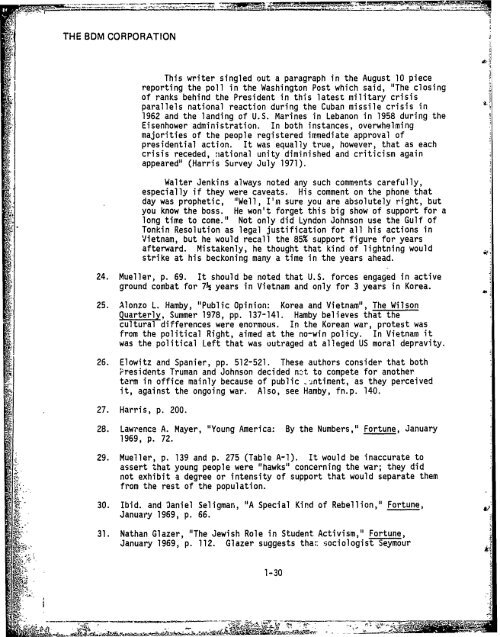policy - The Black Vault
policy - The Black Vault
policy - The Black Vault
You also want an ePaper? Increase the reach of your titles
YUMPU automatically turns print PDFs into web optimized ePapers that Google loves.
THE BDM CORPORATION<br />
This writer singled out a paragraph in the August 10 piece<br />
reporting the poll in the Washington Post which said, "<strong>The</strong> closing<br />
of ranks behind the President in this latest military crisis<br />
parallels national reaction during the Cuban missile crisis in<br />
1962 and the landing of U.S. Marines in Lebanon in 1958 during the<br />
Eisenhower administration. In both instances, overwhelming<br />
majorities of the people registered immediate approval of<br />
presidential action. It was equally true, however, that as each<br />
crisis receded, national unity diminished and criticism again<br />
appeared" (Harris Survey July 1971).<br />
Walter Jenkins always noted any such comments carefully,<br />
especially if they were caveats. His comment on the phone that<br />
day was prophetic, "Well, I'm sure you are absolutely right, but<br />
you know the boss. He won't forget this big show of support for a<br />
long time to come." Not only did Lyndon Johnson use the Gulf of<br />
Tonkin Resolution as legal justification for all his actions in<br />
Vietnam, but he would recall the 85% support figure for years<br />
afterward. Mistakenly, he thought that kind of lightning would<br />
strike at his beckoning many a time in the years ahead.<br />
24. Mueller, p. 69. It should be noted that U.S. forces engaged in active<br />
ground combat for 7½ years in Vietnam and only for 3 years in Korea.<br />
25. Alonzo L. Hamby, "Public Opinion: Korea and Vietnam", <strong>The</strong> Wilson<br />
Quarterly, Summer 1978, pp. 137-141. Hamby believes that the<br />
cultural differences were enormous. In the Korean war, protest was<br />
from the political Right, aimed at the no-win <strong>policy</strong>. In Vietnam it<br />
was the political Left that was outraged at alleged US moral depravity.<br />
26. Elowitz and Spanier, pp. 512-521. <strong>The</strong>se authors consider that both<br />
Presidents Truman and Johnson decided nt to compete for another<br />
term in office mainly because of public - •ntiment, as they perceived<br />
it, against the ongoing war. Also, see Hamby, fn.p. 140.<br />
27. Harris, p. 200.<br />
28. Lawrence A. Mayer, "Young America: By the Numbers," Fortune, January<br />
1969, p. 72.<br />
29. Mueller, p. 139 and p. 275 (Table A-l). It would be inaccurate to<br />
assert that young people were "hawks" concerning the war; they did<br />
not exhibit a degree or intensity of support that would separate them<br />
from the rest of the population.<br />
30. Ibid. and Daniel Seligman, "A Special Kind of Rebellion," Fortune,<br />
January 1969, p. 66.<br />
31. Nathan Glazer, "<strong>The</strong> Jewish Role in Student Activism," Fortune,<br />
January 1969, p. 112. Glazer suggests tha-: !sociologist Seymour<br />
1-30
















